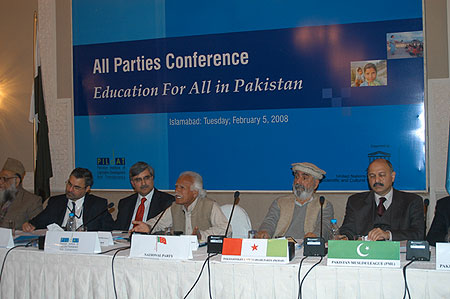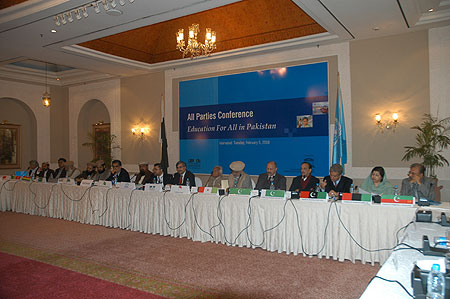|
|
| |
| EVENTS |
|
|
> Political Parties Commit to Increase Education Budget to 4% of the GDP within three years
Joint Declaration on �Education for All in Pakistan� goals issued at Islamabad |
|
|
| |
Islamabad, February 05: A PILDAT-UNESCO organized All Parties Conference on �Education For All in Pakistan�, concluded here with the issuance of a Joint Declaration committing 16 major political parties of the country on eight basic education and literacy objectives. |
|
| |
The unanimously issued Joint Declaration on �Education For All in Pakistan� commits the political parties to increase the present allocation of the education budget from 2.4% to 4% of the GDP within the next three years with an increased focus on areas lagging behind in education and literacy indicators. Furthermore, the parties will ensure allotment of 10% of the annual education budget to literacy programmes, provision of free and compulsory primary education to all school-aged children in the country and will ensure 100% primary enrolment, 75% primary completion rate as well as 85% adult literacy by the year 2015. The parties also committed to abolish political favouritism and interference in education departments, to modernize and introduce a uniform core curriculum in schools across the country and to effectively utilize the allocated education budget each year.
|
|
| |
The 16 political parties which signed the Joint Declaration were represented by Haji M. Adeel from Awami National Party (ANP), Mr. Takri M. Mengal (Balochistan National Party -Awami), Dr. Jehanzeb Jamaldini (Balochistan National Party-Mengal), Senator Professor Ibrahim (Jamaat e Islami Pakistan), Senator Shahid Bugti (Jamhoori Watan Party), Maulana Amjad Khan (Jamiat Ulema-e-Islam-F), Pir Nasir Jamil Hashmi (Jamiat Ulema-e-Pakistan-Noorani), Professor Sajid Mir (Markazi Jamiat-e-Ahl-e-Hadeeth), Senator Tahir Mashhidi (Muttahida Quami Movement), Dr. Abdul Hayee Baloch (National Party), Senator Abdur Rahim Mandokhail (Pakhtoonkhwa Milli Awami Party), Raja Zafar ul Haq (Pakistan Muslim League-N), Senator Mushahid Hussain (Pakistan Muslim League), Shah Mehmood Qureshi (Pakistan Peoples Party), Senator Anisa Zeb Tahirkheli (Pakistan People�s Party-Sherpao) and Dr. Arif Alvi (Pakistan Tehreek-e-Insaf). |
|
| |
Speaking on the occasion, Senator Mushahid Hussain Sayed, Secretary General of the Pakistan Muslim League (PML) announced party plans to initiate mass literacy programs across the country, to increase teacher retirement age from 60 to 65 years, modernization of curricula and to ensure transparency in scholarship awards by the Ministry of Education. Senator Mushahid Hussain emphasized the need to ease visa restrictions on Pakistani students seeking to undertake advanced studies in Physics and Engineering due to a negative perception of Pakistan�s nuclear state status. |
|
| |
Mr. Shah Mehmood Qureshi, Chairman of Pakistan People�s Party, Punjab pointed out the sustained lack of political will in developing the education sector evident from the more than 22 policy action-plans introduced by various governments of Pakistan and their inability to foster any change in basic education and literacy indicators of the country. While endorsing the Joint Declaration commitment of increasing education budget to 4% of the GDP, he stressed on removing institutional weaknesses that hinder effective expenditure of education funds. |
|
| |
Raja Zafar ul Haq, Chairman of the Pakistan Muslim League (N) highlighted the potential of young Pakistani students and pointed out that these children, when given the right opportunities and access to education can exceed internationally set standards of high learning achievement. Mr. Abdul Hayee Baloch, President of the National Party and Haji M. Adeel from Awami National Party (ANP) elaborated on the need for primary education to be taught in the mother tongue of the students. Endorsing this view, Senator Shahid Bugti, representative of the Jamhoori Wattan Party (JWP) compared the bleak education and literacy scenario in Pakistan with the much poorer countries of Africa with better adult literacy rates including Rwanda, Malawi and Nigeria. Senator Abdur Rahim Mandokhail from the Pakhtoonkhwa Milli Awami Party (PKMAP) underlined the need to make political parties accountable to the masses and not to the perceived powerbases of the country as witnessed over the years. |
|
| |
Dr. Jehanzeb Jamaldini from the Balochistan National Party (Mengal) and Mr. Nasir Jamil Hashmi from Jamiat-e-Ulema Pakistan pointed out the problem of political interference at the district level and proposed more accountability and transparency in the system. Mr. Yasin Zafar from Markazi Jamiat-e-Ahle Hadeeth (MJAH) talked about the need to encourage religious educational institutions to grow and improve at par with the mainstream educational institutions. Senator Tahir Mashhidi from the Muttahida Qaumi Movement (MQM) endorsed the mainstreaming of religious institutions with a focus on modernizing their curricula and to abolish the existing multi-class education systems in the country. |
|
| |
|
|
| |
|
|
| |
|
|
| |

|
|
| |
|
|
| |

|
|
|
|
|
|
|
|
|